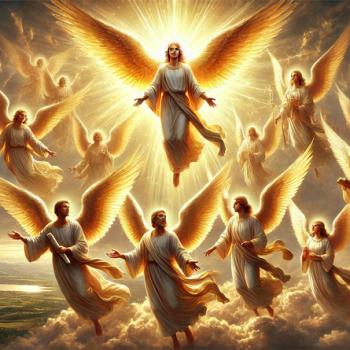Let us see those things that He does for us every day!
How many tastes for the mouth! How many beauties for the eye!
How many melodies for the ear! How many scents for the nostrils!
Who is sufficient in comparison to the goodness of these little things?
Who is able to make thousands of remunerations in a day?
Nine centuries later St. Francis of Assisi echoed something of St. Ephrem's delight in the goodness of creation, above all in his Canticle of Brother Sun, part of which reads as follows:
Praised be You, my Lord, with all your creatures,
especially Sir Brother Sun,
Who is the day and through whom You give us light.
And he is beautiful and radiant with great splendor;
and bears a likeness of You, Most High One.
Praised be You, my Lord, through Sister Moon and the stars,
in heaven You formed them clear and precious and beautiful.
Much of what I have said up to now refers to what is sometimes called "original creation," that is, to God's creating "in the beginning," but this ought never be understood apart from "ongoing creation" (creatio continua), that is, God's providentially holding everything in existence. Perhaps no one has expressed this in such memorable imagery as the 14th-century Englishwoman Julian of Norwich, whose book of Showings has become enormously popular in recent decades. In one of the best-known passages from her work, Julian writes that
our good Lord showed a spiritual sight of his familiar love. I saw that he is to us everything which is good and comforting for our help.... And so in this sight I saw that he is everything which is good, as I understand.
And in this he showed me something small, no bigger than a hazelnut, lying in the palm of my hand, as it seemed to me, and it was as round as a ball. I looked at it with the eye of my understanding and thought: What can this be? I was amazed that it could last, for I thought that because of its littleness it would suddenly have fallen into nothing. And I was answered in my understanding: It lasts and always will, because God loves it; and thus everything has being through the love of God.[9]
In addition to original creation and ongoing creation, there is our Christian belief in a "new creation" (creatio nova). Both Christians and Buddhists recognize that there is suffering and incompleteness in the world, even if our respective understandings of the origin of suffering are not exactly the same. For Christians, at least much of what is unsatisfactory about our life is due to that self-centered turning away from God that we call "sin." Already St. Paul, in a well-known passage from his Letter to the Romans, sensed that sin has affected not only us human beings who perpetrate it but also the very world in which we live. In his words, "I consider that the sufferings of this present time are not worth comparing with the glory about to be revealed to us. For the creation waits with eager longing for the revealing of the children of God; for the creation was subjected to futility, not of its own will but by the will of the one who subjected it, in hope that the creation itself will be set free from its bondage to decay and will obtain the freedom of the glory of the children of God" (Romans 8:18-21).
I will be the first to admit that a passage like that is open to various interpretations. Nowadays most scientists believe that after some incalculable number of years the forces of entropy will lead the entire universe to devolve into a state of low-grade radiation with a temperature approaching absolute zero, unable to support any kind of life. Some theologians have found that scenario so troubling that they interpret Paul's words in Romans, along with similar passages in the Book of Isaiah about "a new heavens and a new earth" (Isaiah 65:17), in a very literal sense as portending an eventual, momentous renewal or redemption of all creation.
I myself am far more cautious in this regard. As I have written elsewhere, "One of the most constant themes in the spiritual teaching of the world's religious traditions is that human beings ought not to cling to possessions of one sort or another and that things will in fact normally be much more appreciated and enjoyed if one does not cling to them or yearn for them to have a permanence that is not appropriate" (Theology and Modern Science: Quest for Coherence, p. 107-8). This surely holds not just for objects in our immediate vicinity but for the universe as a whole. As William Blake wrote in his short poem "Eternity,"
He who binds to himself a joy
Does the winged life destroy;
But he who kisses the joy as it flies
Lives in eternity's sun rise.




